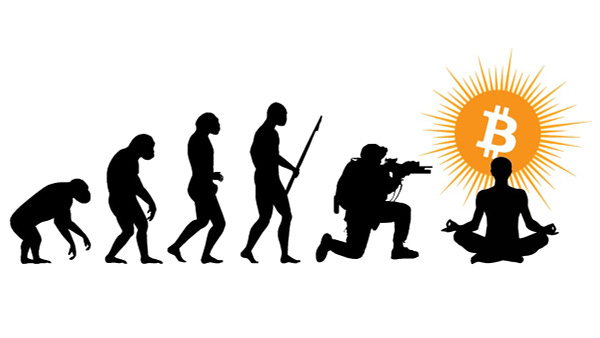Bitcoin is the War on War
After abject government failures in "The War on Poverty," "The War on Drugs," and "The War on Terrorism," Bitcoin promises to emerge victorious in "The War on War."
Since time immemorial, the threat of force has circumscribed the organization of human beings. “Might is right” is an axiom which has sculpted the patterns of human settlement since before written history. This power to control people and their property has always accreted to those most capable of projecting force across distance—which is the physics formula for work. Unfortunately, this ancient proclivity toward the work of violence persists in modernity, despite the many moral advances made.
“The real problem of humanity is the following: we have Paleolithic emotions, medieval institutions, and god-like technology.”—E.O. Wilson
The modern nation-state wages war to reach consensus as to “who owns what.” Typically armed conflicts are over territory, but can also be waged over capital assets like factories, taxpayers, and gold. War is the “proof of work” energy (and capital and life) expenditure among nation-states to determine the distributions of property rights. Said differently: war is the consensus mechanism for property distributions. Ancient monarchs were similarly antagonistic toward one another in their contentions over property, but were forced to finance their military excursions within the confines of their own balance sheets—from gold contained within their own “war chests.” With the advent of fiat currency, nation-states can (and do) plunder the entire savings of their citizens (via inflation) to wage war virtually ad infinitum. Geopolitical incentives in a world where gold has been monopolized through violence favor ceaseless military campaigns, cultural and moral degradation, and the economic enslavement of citizens by fiat.
“There are two ways to enslave a nation. One is by the sword, the other is by debt.”—John Adams
Key to understanding the noxious level of debt that has come to dominate modern economies are the fundamentals of property. At the most personal level, we are each our own property. Only you can move your left arm, and only I can move mine, therefore we are each self-owned. In the truest sense, no one can force anyone else to do anything, we each choose our own actions. In the deepest sense, property is a relationship between each person and their time, between each person and the fruits of their labor. We each choose what work to perform, and which elements of existence to infuse our property with: whether planting a garden or starting business, we selectively claim property by allocating our time to making it more valuable through work. By trading the fruits of our labor with similarly self-owned others, the division of labor is attained, wealth is created, and the bedrock of civilization is constructed. All human rights are derived from the responsibilities enshrined in property rights.
“The right to life is the source of all rights — and the right to property is their only implementation. Without property rights, no other rights are possible. Since man has to sustain his life by his own effort, the man who has no right to the product of his effort has no means to sustain his life.”—Ayn Rand
Since property includes people and their creations, power over property is of primary allure, especially for the power-hungry. For this reason, the forced redistribution of property motivates most warfare. The effectiveness of a veiled threat of force in mobilizing human action historically has relied upon victims fearing for their own lives and choosing to comply with the demands of aggressors against their property. Citizens that tolerate the existence of central banking and the debt-based monies they impose do so only out of fear or ignorance: no one freely chooses to have their property (which includes their person) violated. Power over property—a sophisticated expression of the primitive human impulse for territoriality—explains why the US violently imposes the dollar hegemony on the world.
Veiled threats of force are ineffective on the fearless. When facing obstinant citizens, the effectiveness of systemized nation-state violence depends on the simple economic fact that property can be stolen after victims are killed. Nuke a city, and the gold remains intact and ready for easy confiscation. The incentive schema inherent to a geopolitical order with gold as its base layer money invites violence, and is causative to the endless human embroilment in armed conflict. Said simply: the violability of property is the primary motivator of violence. When the relationship called property is corruptible, coercion becomes profitable, causing people to engage in corrupt and violent acts. This is true across scales: a bully beats up kids to take their lunch money for the same reason the US drops bombs in the Middle East.
Inviolable property, then, is the only path to sustainable peace. When property cannot be stolen, the economic motivations for violence and coercion are dampened. To say it more precisely, the more expensive it is to transgress against the property of others, and the greater the risk of theft, the less antagonistic humans will act toward one another. Incentives are the soil from which human patterns of action spring forth. Again, this deeply rooted truth is scale-invariant: when lunch money is theft-proof, the bully loses his leverage over other kids; and when the useful properties of gold are perfected in digital form by Bitcoin, nation-states lose both their incentive to attack each other and their means of off-balance-sheet war financing through fiat currency supply inflation.
An incorruptible disruptor to gold, Bitcoin imposes the disciplinary force of financial prudence on governments in a way that makes resistance futile. The Bitcoin “proof of work” consensus mechanism is a free market alternative to the centrally planned violence inflicted by nation-state warmongering. Bitcoin mining is a more peaceful way to project force across distance to determine the proper distributions of property. A more fruitful competitive outlet for the animalistic energies coursing through each of us, Bitcoin is a bloodless protocol for distributing property. Work is the inextricable means of survival, and Bitcoin channels the work efforts of humans towards more productive and less self-destructive ends. In this way, holding Bitcoin is belligerence toward the systemized predations of nation-states on our property. This is why…
Bitcoin is the War on War.


Perhaps, Bitcoin is the “Moral Equivalent of War” hypothesized by American Pragmatist William James in 1906. I’ll be writing more on this topic in the days ahead, see you again soon…
Thank you for reading Bitcoin is the War on War.
PODCAST
SOCIAL
SUPPORT
Send Bitcoin to my PayNymID: +tightking693
BUSINESSES I LIKE
Translations:
x







reducing enslavement doesn't necessarily mean that there will be less conflict that breeds war. if anything, "war" is just conflict, at-scale. i just do not see the war machines ever tiring here.
but, i'd like to think that it's possible.
What is to stop violence in the attempt to control mining operations? On even torturing people to give up the keys to their "inconfiscatable" Bitcoin